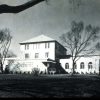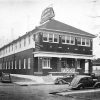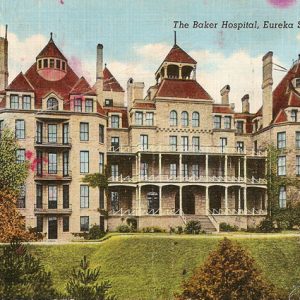calsfoundation@cals.org
Norman Baker (1882–1958)
Norman Glenwood Baker is best known in Arkansas as a promoter of alternative medicine who settled in Eureka Springs (Carroll County) in 1936 and was convicted of mail fraud in 1940. Anti-Semitic and anti-Catholic, he was also a radio pioneer and a candidate for a U.S. Senate seat and for governor of Iowa.
Norman Baker, the tenth and last child of John and Frances Baker of Muscatine, Iowa, was born on November 27, 1882. His father reportedly held 126 patents and operated Baker Manufacturing Company in Muscatine. His mother, prior to her marriage, had written extensively. Baker left high school after his sophomore year, and his early adult years were spent working as a tramp machinist. After witnessing a vaudeville magician act, he organized his own traveling troupe that starred a mind-reader called “Madame Pearl Tangley.” Baker reportedly married one of his Madame Pearl Tangley actresses, but the marriage ended in an annulment. After touring for ten years, and with successive women performing as Madame Tangley, Baker returned to Muscatine in 1914, where he patented the Air Calliaphone, a portable organ run by air pressure that could be heard for a quarter of a mile. In addition, he ran a correspondence art school and a mail-order business.
In 1925, he got the Chamber of Commerce to sponsor his radio station, KTNT (Know The Naked Truth). Although originally licensed at 500 watts, the station’s power was often closer to 10,000, making it heard all across the United States. Focusing on rural and small-town issues, Baker supported Republican Herbert Hoover over Democrat Al Smith in the 1928 presidential race, attacking Smith’s Catholic religion and ties to Tammany Hall. After Hoover’s victory, Baker was invited to a private meeting with the president, and Hoover cooperated in the launching of Baker’s tabloid, the Midwest Free Press, in 1930.
By 1929, Baker had denounced the American Medical Association (AMA), claiming that he had cures for cancer. Although lacking any training at all, Baker organized the Baker Institute at Muscatine. The 100-bed hospital was staffed largely by chiropractors, osteopaths, and physicians from diploma mills. Harry Hoxsey, later one of the nation’s leading proponents of unapproved cancer treatments, worked there for a time. Besides promising to cure cancer, Baker attacked aluminum pots and pans, fluoridation of the water, vaccinations, and even bovine tuberculosis testing. The AMA pressured the Federal Radio Commission (FRC) to shut down Baker, and he lost his license in 1931 as the station closed.
Bereft of radio advertising, the hospital’s business declined. Baker responded to AMA criticism by attacking Dr. Morris Fishbein’s Jewish faith and suing the AMA for calling him a quack, a faker, and a charlatan. The trial in 1932 went against Baker, his cancer cure being nothing more than clover, corn silk, watermelon seed, and water. He also lost his bid to become governor of Iowa.
In 1932, Baker saw Mexico as the solution to his problems. Dr. John Brinkley, who made his name transplanting goat glands into male patients, had already opened station XER at Villa Acuna, opposite Del Rio, Texas. Baker located at Nuevo Laredo, and XENT, with a 100,000-watt transmitter, opened in 1933. He continued to market his cancer cures and, in 1936, returned to Iowa to campaign for the U.S. Senate, though he was unsuccessful. The same year, a ghost-written biography, Doctors, Dynamiters, and Gunmen: The Life Story of Norman Baker, appeared. In 1937, he was convicted in federal court for violating the “Brinkley clause” of the Federal Communications Act of 1934 by shipping gramophone recordings out of the nation for broadcast purposes. Baker’s conviction was overturned on appeal. A number of Arkansas performers nevertheless performed directly in XENT’s studios, notably Fiddlin’ Bob Larkan & His Music Makers.
Baker also followed Brinkley into Arkansas. In July 1937, Baker purchased the Crescent Hotel at Eureka Springs. This great Victorian landmark, erected in 1886, had faded dramatically. The local chamber of commerce, the Bank of Eureka Springs, and the Daily Times Echo all looked to Baker to rejuvenate the town. At the Crescent, Baker painted virtually everything lavender or purple. The polychrome lobby decorated in red, yellow, orange, and black, along with a Calliaphone on the roof, set the institution’s tone. The extensive literature on “Where Sick Folks Get Well” got Baker into trouble with postal inspectors, and he was tried on charges of mail fraud in 1940. Assistant U.S. Attorney Leon Catlett quoted Baker as having said that he could “reap one million dollars out of the suckers in the state” and successfully urged the jury not to let that happen. Baker spent March 1941 to July 1944 at the federal penitentiary at Leavenworth, Kansas. In 1946, he tried unsuccessfully to reopen his Muscatine facility. Thereafter, he lived on a three-story yacht once owned by railroad magnate Jay Gould. He died there of cirrhosis of the liver on September 8, 1958. He was buried in Muscatine next to one of his sisters.
Unlike Brinkley, Baker did not claim to be a doctor. Instead, this showman, with his white suits and lavender ties, hawked a form of populism that distrusted science, education, Jews, and Catholics. Paranoia ran throughout his life, and in Eureka Springs he had his office sealed off in bulletproof glass and kept two submachine guns within easy reach.
For additional information:
DenHoed, Andrea. “The Haunting History of a Huckster’s ‘Cancer Cure.'” New Yorker, April 26, 2022. https://www.newyorker.com/culture/photo-booth/the-haunting-history-of-a-hucksters-cancer-cure (accessed April 27, 2022).
Fowler, Gene, and Bill Crawford. Border Radio: Quacks, Yodelers, Pitchmen, Psychics, and Other Amazing Broadcasters of the American Airwaves. Rev. ed. Austin: University of Texas Press, 2002.
Juhnke, Eric S. Quacks and Crusaders: The Fabulous Careers of John Brinkley, Norman Baker, and Harry Hoxsey. Lawrence: University Press of Kansas, 2002.
Obituary of Norman Glenwood Baker. Muscatine Journal & News Tribune. September 11, 1958. Online at http://iagenweb.org/muscatine/obituaries/ba-obit.htm (accessed February 8, 2022).
Taylor, Troy. The Haunting of America. Chicago: White Chapel Press, 2010.
Winston, Alvin G. Doctors, Dynamiters, and Gunmen. Muscatine, IA: Baker Sales, 1936.
Michael B. Dougan
Jonesboro, Arkansas
 Early Twentieth Century, 1901 through 1940
Early Twentieth Century, 1901 through 1940 Health and Medicine
Health and Medicine Medical Malpractice
Medical Malpractice Baker Hospital
Baker Hospital 



Comments
No comments on this entry yet.